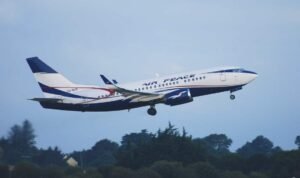In a bid to address the growing frustration of passengers, the Nigerian government has proposed stricter sanctions on airlines responsible for excessive flight delays and cancellations. The proposal, which has garnered attention from both passengers and industry stakeholders, seeks to hold airlines more accountable for disruptions that negatively impact travelers.
The Nigerian Civil Aviation Authority (NCAA) recently put forward a draft regulation that includes fines, flight compensations, and even suspension of operating licenses for airlines found guilty of consistent delays and cancellations. The move comes as a response to the increasing number of complaints from passengers who have faced untimely departures, poor communication, and lack of compensation from airlines.
In a statement, the government emphasized the importance of providing a reliable and efficient air transport service, given the crucial role aviation plays in the country’s economy. “Airlines must ensure that they uphold their contractual obligations to passengers, and failure to do so will not be tolerated,” the statement read.
Industry experts have welcomed the proposed measures, highlighting the need for a more regulated and transparent system. Many passengers have expressed dissatisfaction with the current state of the aviation sector, citing frequent delays, long wait times, and lack of customer service. These issues have often resulted in passengers being stranded at airports for hours, with little or no support from the airlines.
Under the new regulations, airlines would be required to provide timely updates to passengers in the event of delays or cancellations and offer compensation or alternative arrangements. Additionally, the proposed sanctions would involve financial penalties for airlines that fail to meet the required standards, as well as temporary suspension of services for those with a history of poor performance.
The government’s move is seen as an effort to bring more accountability to the Nigerian aviation industry, particularly as travel continues to rebound after the challenges posed by the COVID-19 pandemic. The proposed sanctions are expected to push airlines to invest more in their operations, enhance customer service, and improve their overall performance.
As the draft regulation awaits further review and approval, stakeholders in the aviation industry are keeping a close eye on how the new measures will be enforced and how airlines will respond to the tighter oversight. For now, many passengers remain hopeful that the changes will bring much-needed relief and a better flying experience in Nigeria.


